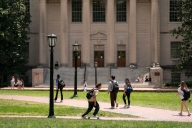You have /5 articles left.
Sign up for a free account or log in.
An investigation by the journal Nature into the retraction last year of major research findings by a physicist at the University of Rochester reveals significant flaws in how university officials and scientific journals handled the matter.
The researcher, Ranga Dias, had, through the early part of this decade, published a series of findings about materials that could conduct electricity at room temperatures and at relatively modest pressures. But his studies were dogged by allegations of manipulated and fabricated data and of plagiarism revealed by The Wall Street Journal, Science and Nature.
The in-depth inquiry by Nature’s news team finds, among other things, that Dias’s graduate students had repeatedly raised concerns about the validity of the research (even though they were shut out of key parts of the research process), but that their concerns were given short shrift by officials at Rochester. The university reportedly conducted three investigations of Dias’s work before August 2023 that, according to Nature, did not interview skeptical graduate students. None of those inquiries found any evidence of wrongdoing.
Only after another of the team’s papers was under review for retraction last summer did Rochester conduct another review that interviewed the graduate students; it led to Dias being stripped of his students, and the University of Rochester launched a fourth investigation—this time, the students say they were interviewed.
Rochester officials issued a statement saying they had “taken very seriously the concerns regarding data that served as the basis for several papers” by Dias, citing the last of its investigations. The statement did not address the issues raised by Nature, including those about the rigor of its prior investigations.









